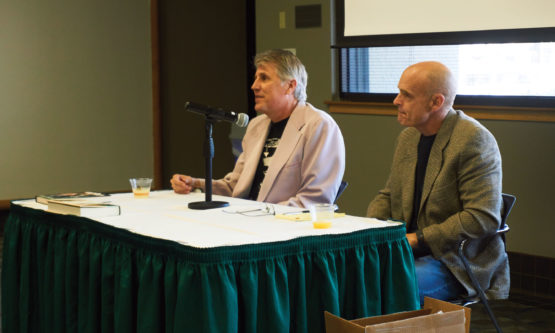What comes to mind when you think of the Gulf of Mexico?
As Floridians, we are privileged to live next to it, therefore we often associate it with beauty, beaches and fishing. Across the country, however, many define the Gulf by the Deepwater Horizon oil spill.
A BP owned drilling rig, Deepwater Horizon, experienced unregulated rises of methane gas into the rig early on the night of April 20, 2010. The resulting explosion caused the death of 11 workers and dumped 210 million gallons of oil into the Gulf, the largest accidental oil spill in history.
Worldwide news coverage soon followed, rebranding the Gulf of Mexico as an ecological disaster for the foreseeable future.

Striving to reclaim the Gulf as a significant figure beyond petroleum spills, Jack Davis wrote “The Gulf: The Making of An American Sea.”
Davis took part in a discussion over his most recent publication in Harbor Hall, Wednesday, March 22. With the help of Lee Irby, a fellow author awaiting the release of his newest novel “Unreliable,” Davis discussed the challenges of documenting the Gulf’s unique history as well as his outlook on the future.
A USFSP alumnus, Davis earned his master’s degree in history in ‘89. He was later hired as a professor at the University of Florida with a focus on environmental history. His previous works have earned recognitions such as the Charles S. Sydnor Prize for the best book in southern history, and the gold medal in the nonfiction category of the Florida Book Awards
Banter and story swapping defined the first half of the evening as Davis and Irby discussed the lifestyle of a writer, their previous works and shared experiences of growing up in the segregated South. The two USF alumni also shared their first meetings and roots in the St. Petersburg area.
“I just owe so much to this campus, I don’t think I’d be where I am now without USF St. Pete,” said Irby.
Much of the event revolved around how Davis’ experience as an ecological historian influences his writing, specifically in his newest piece, “The Gulf: The Making of An American Sea.”
His recently released work tells the tale of the Gulf of Mexico from prehistoric beginnings to its prospective future. Davis connects the body of water to humanity through both his own interactions and experience.
“When writing about ecology, you’re really in touch with your subject through touch, taste, smell, hearing,” said Davis. “I wanted this sensory experience to help carry the writing, to guide it.”
The discussion also addressed the role of historic figures in The Gulf, expounding on the narrative influence of many colorful characters, such as the king of Tabasco turned conservationist.
“I also tried to understand the historic figures, to understand how they interacted with their environment using the same senses,” said Davis.
The conversation shifted midway through the event to focus more on ecological concerns, economic possibility and activism within Florida communities.
Davis subtitled his book “The Making of An American Sea” with a purpose: the BP oil spill had tarnished the once prestigious name of the Gulf of Mexico.
The landmark only garners respect within groups of academics and activists, while the rest of the population knows it mainly for the widescale pollution which afflicted it. “The Gulf” was written to help America realize the national treasure it holds while better understanding our history.
“It’s one of the greatest estuarine environments in the world,” stated Davis, “And because 85 percent of the gulf’s freshwater comes from its five bordering states, we have a profound impact on it.”
Recognizing our integral contribution to the natural resource is only a minor part of the issue, however.
“It’s a sea that has shaped our history, and has given us a lot,” said Davis, “But we need to give something back. Not anything massive, just respect for what it is.”



